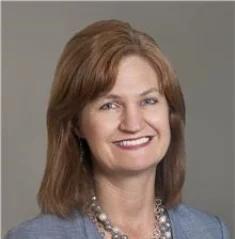- Center on Health Equity & Access
- Clinical
- Health Care Cost
- Health Care Delivery
- Insurance
- Policy
- Technology
- Value-Based Care
As More Survive Cancer, Issues With Sleep, Fatigue, Cognitive Function on the Rise
The April 2 plenary session at the National Comprehensive Cancer Network (NCCN) 2023 Annual Conference, entitled, “Sleep Disorders, Fatigue, and Cognitive Function in Cancer Survivors" reviewed guidelines for handling symptoms that are increasingly common as the survivorship ranks grow.
As a nurse practitioner at Fred & Pamela Buffett Cancer Center in Omaha, Nebraska, Jennifer Schmitz, MSN, APRN, FNP-C, knew fatigue came with cancer. But she didn’t fully grasp it until she was diagnosed with acute lymphoblastic leukemia (ALL) in 2017. Over the next several years, all the symptoms patients had described—the insomnia, the cognitive issues, restless leg—slowly became real.
“Restless leg is a real thing,” Schmitz said, “I used to think that was kind of a funny thing when patients would tell me they had restless leg. I never really understood it until I had it myself.”
Schmitz opened the April 2 plenary session at the National Comprehensive Cancer Network (NCCN) 2023 Annual Conference, entitled, “Sleep Disorders, Fatigue, and Cognitive Function in Cancer Survivors.” Moderated by Andrew T. Day, MD, MPH, of UT Southwestern Simmons Comprehensive Cancer Center and vice chair of the NCCN Survivorship Panel, the session covered NCCN guidelines for handling symptoms that are increasingly common as the survivorship ranks grow.
According to 2023 data from the America Cancer Society, there were 18.1 million cancer survivors in the United States in January 2022, which is 5.4% of the population. Cancer survivors will number 22.5 million by 2032.1 And yet, panelists acknowledged, most oncologists were trained in the days when the focus was simply to keep people alive, not to address helping them live well, much less work or care for a family.
Schmitz was a busy working mother with children ages 2 and 5 when the bone pain, mouth sores, and other symptoms led her to look for answers
Schmitz

that led to her ALL diagnosis. That led to a very long protocol mostly of intravenous chemotherapy. But as the audience knew, “It’s not just the cancer treatment—the medications, the chemo itself—that really affects you; it’s everything else.”
Blood transfusions. Trips to the intensive care unit. Drug reactions. Blood clots around her port. Early menopause. The antifungal medication, voriconazole, “is not my friend,” she said, and it caused hallucinations.
Just being in a hospital itself makes it hard to sleep. And “you’re on a whole lot of steroids,” she said. “I would get up and clean my hospital room all night long, because I couldn’t sleep.”
She was inpatient for 6 months, a terribly long time, “especially when you have 2 little kids, and you can’t see them every day. Your brain really starts to play tricks on you.”
Schmitz was finally able to leave and continue chemotherapy on the POMP protocol (6-mercaptopurine + vincristine + methotrexate + prednisone), and after 3 months returned to work. “It was a blessing,” she said. “But it was also really hard.”
Walking 6 or 7 miles a day around a hospital is not easy with neuropathy in your feet. It led to falls. It meant Schmitz had to rest, sometimes right on the floor. People knew her story and were kind. But even as her treatments eased, her fatigue continued. And then, at the moment of excitement when her treatment ended, COVID had started. “I couldn't even hug my oncologist, which was really awful….And it was quite the experience. But my bone marrow did confirm I was in remission.”
Schmitz still struggles with short-term memory loss. She’s gone back to running. She lifts weights to rebuild her strength. She brings a new perspective to her work with people with cancer. “I get to work with other cancer survivors now and help them through their journey,” she said. “I've really learned to just slow down and truly not sweat the small stuff.”
“Life is a blessing. It just looks a little bit different now.”
“No Bloody Clue”
Eric S. Zhou, PhD, an assistant professor of pediatrics in the Division of Sleep, Dana-Farber Cancer Institute, Harvard Medical School, said there are 83 different types of sleep disorders across 7 different categories in the International Classification of Sleep Disorders, including breathing disorders,
Zhou

circadian rhythm disorders, parasomnias, and sleep-related movement disorders. And yet in a recent review looking at sleep disorders among cancer survivors, the conclusion found “the prevalence of overall particular types of sleep disorders and cancer cannot be ascertained.”
“Which means we really have no bloody clue how many of our patients are survivors [who] really have diagnosable sleep disorders,” Zhou said.
A major challenge here is that many sleep studies rely on self-report data, but some disorders require a sleep study or a polysomnography to be performed. “But these are really labor intensive or costly things,” and have not been prioritized.
Which means that science has few answers about sleep and cancer, even though it’s one of the largest issues that patients will face during treatment as well as later, as survivors.
Better sleep leads to better survival, and NCCN guidelines recommend cognitive behavioral therapy for insomnia (CBTI) as the preferred treatment for poor sleep. This 5-component treatment is also endorsed by the American College of Physicians and the American Association of Sleep Medicine. The key elements are stimulus control and sleep restriction.
“Sleep restriction simply gets to the heart of insomnia, which is patients are in bed trying to get more sleep, rather than good quality sleep. That's the right amount of sleep,” Zhou said. “Sleep stimulus control gets to the idea that patients who have insomnia, try really hard to sleep. And what that results in their inability to fall asleep.”
Cancer centers are not doing a good job, according to a survey by the National Cancer Institute that found the 25 best programs were only getting good insomnia treatment to 50% of survivors. How can this be improved? Zhou recommended 3 things:
- Screening for sleep disorders, within the existing workflow.
- Embedding care within the site, because when the referral is elsewhere, patients are less likely to go.
- Train providers to address sleep issues, starting in medical school.
Fatigue: the Most Distressing Symptom
Kristin Dickinson, PhD, RN, OCN, and assistant professor of nursing at the Fred & Pamela Buffett Cancer Center, said that while there is no single agreed upon definition for cancer-related fatigue, it is the most common
Dickinson

symptom reported by patients. “And, it’s often reported to be the most distressing symptom, even more so than other symptoms such as pain, nausea, where they're often able to have medications to control those symptoms,” she said.
As Schmitz had noted, Dickinson said fatigue doesn’t stop when treatment ends. “We can have up to 50% of patients still reporting fatigue in long-term survivorship, 5 or more years from diagnosis,” Dickinson said. “We’re seeing on average 30% of patients reporting that fatigue is a distressing symptom in their life. In terms of quality of life, fatigue is often under reported under diagnosed and undertreated.”
Also shocking: only 20% believe anything can be done for fatigue, so this may mean many patients aren’t even reporting it. Patients don’t want to be seen as complaining, Dickinson said.
And yet, fatigue can affect the ability to manage symptoms. NCCN guidelines call for screening at the initial visit—because fatigue can start even before treatment—and at every recurring visit. “NCCN recommends using a valid and reliable tool to screen and they have an appendix that lists and recommends different tools that are available,”’ she said.
Dickinson pointed to the NCCN algorithms that recommend using validated tools that determine if fatigue is mild, moderate, or severe, and what are the treatable or contributing factors. If medical management steps are taken and the patient still reports fatigue, “then we move into the general management strategies. And these strategies are stratified by those undergoing active treatment, those in post treatment and those at the end of life.”
She highlighted the evidence categories for the NCCN guidelines. "This speaks to the strength and rigor at which these guidelines are developed,” she said. Nonpharmacologic management strategies, particularly exercise, are emphasized before patients rely on pharmacological solutions. Dickinson highlighted resources from the American College of Sports Medicine and LIVESTRONG, which is specific to cancer survivors.
Guidelines are in line with general recommendations for physical activity: 150 minutes a week, over 2 to 3 days per week of strength training—but similar benefits have been seen with 30 minutes 3 times a week of aerobic activity only to address cancer-related fatigue.
Cognitive effects of cancer and its treatments, said Halle C.F. Moore, MD, of Cleveland Clinic’s Taussig Cancer Institute, can be varied. People can feel they can’t complete tasks; they can’t find words; they need to leave
Moore

themselves notes. “Sometimes these concerns can be severe enough to affect performance at work. And these symptoms can make an individual feel very isolated,” she said.
As with fatigue, there are no standard diagnostic criteria for cognitive impairment related to cancer—and this make studying cognitive impairment a challenge.
Moore often hears the term “chemo brain,” relating to the “fog,” that individuals experience during or after chemotherapy. “However,” she said, “We know that-cancer related cognitive changes can go well beyond that. There’s a more general term, cancer treatment associated cognitive changes, taking into account that other cancer treatments, endocrine treatments, target therapy, radiation surgery can all contribute to cognitive changes.”
Even before chemotherapy starts, surgery and anesthesia can cause cognitive issues for up to a third of patents with cancer, Moore said, even if it’s short-lived. “While inflammatory processes that are occurring might be contributing, or the anxiety that surrounds a cancer diagnosis, the sleep issues associated with that anxiety could affect one's cognitive function, or perhaps there [are] common risk factors for whatever caused the cancer. And that might also cause cognitive impairment.”
From 50% to 70% of patients will have cognitive issues during treatment, and a third will experience lingering symptoms, Moore said. “If you look at long-term cross sectional data, if cancer survivors in the general population have about a 14% reporting of memory problems—which compares with about 8% in the general population without a cancer history—and if you look at those individuals who had chemotherapy, that rate is even higher.”
So, what are the risk factors? Age, hormonal factors—such as menopause—or certain central nervous system (CNS) therapy delivery systems. And it’s known that quality of life is affected, whether or not it’s reported.
“In terms of assessment, some patients may need to undergo formal neuropsychological evaluation and particularly if there's a disability that suspected and they may need disability benefits,” Moore said. “Again, these tests don't always correlate with the patient experience, so they need to be used selectively,” For example, CNS imaging might not be needed to diagnose cancer related cognitive impairment.
Moore discussed the concept of cognitive reserve, which addresses individuals who were high functioning before cancer. “They can increase activity and other parts of the brain. And they can maintain that high performance, even though that person's perception is that this is very hard.”
But for an older patient, or someone already taking many medications, pain or chemotherapy can rob them of what limited function they had. This is different from dementia, which tends to be progressive.
“The vast majority of individuals with cancer related cognitive impairment will actually experience improvement in symptoms over time, rather than worsening. And these changes are often subtle,” Moore said.
What can a patient do? As with addressing fatigue and sleep, trying to maintain one’s prior level of function may not be attainable. But doing what’s possible is a good idea. “Jennifer's instinct to keep running I think is right on. Go keep doing it,” Moore said.
Finding resources for patients can be challenging. “These may be at your institutions; you may not even know about them. Often, these are found in occupational therapy. At my institution. It's our speech therapy department that does the cognitive rehabilitation.”
For some patients, psychotherapy can offer the cognitive behavioral therapy that helps with sleep. A memory clinic may be a resource if symptoms persist. NCCN guidelines suggest a trial of methylphenidate modafinil be considered, but Moore said the data for the pill “are less than convincing.”
Schmitz said the disconnected nature of survivorship resources was consistent with her experience.
“I think there's a lot more room for growth in the survivorship world. I really didn't have a lot of people helping with that a lot of the resources I had to find on my own,” she said. “And I'm really hoping that, as practitioners and providers in the oncology world, we're going to continue to get better at that. Because there's a lot more people like me out there.”
The Importance of Examining and Preventing Atrial Fibrillation
August 29th 2023At this year’s American Society for Preventive Cardiology Congress on CVD Prevention, Emelia J. Benjamin, MD, ScM, delivered the Honorary Fellow Award Lecture, “The Imperative to Focus on the Prevention of Atrial Fibrillation,” as the recipient of this year’s Honorary Fellow of the American Society for Preventive Cardiology award.
Listen
Promoting Equity in Public Health: Policy, Investment, and Community Engagement Solutions
June 28th 2022On this episode of Managed Care Cast, we speak with Georges C. Benjamin, MD, executive director of the American Public Health Association, on the core takeaways of his keynote session at AHIP 2022 on public health policy and other solutions to promote equitable health and well-being.
Listen
